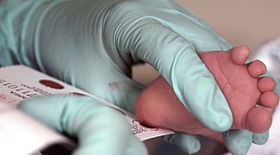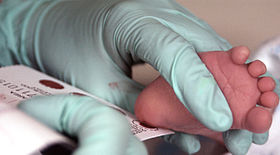A bill to offer optional testing of Georgia newborns for Krabbe disease, a rare genetic disorder, is heading to Gov. Nathan Deal for his signature.
The state Senate on Friday unanimously passed House Bill 241, named Cove’s Law, for 19-month-old Cove Ellis, a Georgia child recently diagnosed with Krabbe disease.

Families of children with the disease and other advocates for patients have urged testing of newborns, saying it gives parents the ability to intervene in aggressive cases of Krabbe.
The optimal treatment, they say, is a stem-cell transplant on the afflicted infant fairly soon after birth.
The bill would allow Georgia parents to pay for a $3 to $5 screening test, according to Rep. Lee Hawkins (R-Gainesville), the bill’s sponsor. Passage of the legislation, he said, would “allow the parent to make the decision’’ on whether to test their baby.
HB 241 requires the Department of Public Health to provide a referral system for parents who wish to have the test performed on their child.
The form of Krabbe that strikes newborns is caused by a change, or mutation, in the gene that carries the blueprints for an enzyme called galactosylceramidase, which is crucial to wrapping protective insulation called myelin around nerves. Without it, the brain and nerves deteriorate.
The disease is rare, striking between 1 in 100,000 and 1 in 350,000 babies. Infants with Krabbe typically die before their second birthday.

The issue is more controversial than one might expect, because many doctors and geneticists have strong reservations about the screening process. One problem with the screening test, they say, is a high percentage of false positives.
These experts, while they are sympathetic to the parents’ cause, say not all children survive the transplant. Those who do often face physical and developmental delays.
The treatment can cause other problems, too.
New York launched a Krabbe screening program in 2006, and three other states — Missouri, Kentucky and Ohio — have also added Krabbe to their newborn testing panels.

Six other states — Illinois, Louisiana, New Jersey, New Mexico, Pennsylvania and Tennessee — have passed laws that would allow screening but have not yet implemented their programs. In some of those cases, state health departments have blocked screening for Krabbe, citing both the expense of the testing and the lack of clear benefit from the treatment.
If a newborn isn’t diagnosed soon after birth, a transplant won’t work, doctors say.
Anna Grantham, a spokeswoman for Hunter’s Hope, a patient advocacy group, said in a recent written statement to WebMD, GHN’s news partner: “The outcome for children who aren’t diagnosed in time for treatment versus those who are is tremendous. I’ve met several children who have undergone treatment — they go to school, they’re mobile, they’re able to communicate, and most importantly, they are living.”
Here’s a link to more In-depth coverage of Krabbe disease by GHN and WebMD News.

